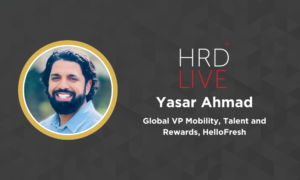How does talent mobility fuel engagement?
- 5 Min Read
Industry analyst and popular podcaster, Ben Eubanks joined HRD connect to discuss the necessity of a talent mobility strategy for employee engagement, and its impact on the rising gig economy. He also revealed how HR can make the most out of a talent mobility plan. Talent mobility and its link to the rising gig economy […]
- Author: Unzela Khan
- Date published: Aug 23, 2017
- Categories

Industry analyst and popular podcaster, Ben Eubanks joined HRD connect to discuss the necessity of a talent mobility strategy for employee engagement, and its impact on the rising gig economy. He also revealed how HR can make the most out of a talent mobility plan.
Talent mobility and its link to the rising gig economy
Data showing the link between a lack of talent mobility plans and the increasing drive towards a gig economy mindset in employees, suggests that employee satisfaction has become more necessary than ever.
Ben Eubanks said: “I think data in the last year or so showed that full-time employees in the US have remained pretty static and unchanging. However, the number of gig, freelancers and contract workers has increased strongly. That doesn’t just mean we have a group of gig workers, it just means that these people are doing this gig in addition to their full-time jobs.”
Employees are therefore looking for a way to satisfy themselves when they feel they are not fulfilling their career plans through their day to day jobs. When passion becomes an integral need, talent mobility plans can help in satisfying that passion by providing a clear career path and showing room for growth and achievement.
Ben adds: “I have a good friend who works in job he doesn’t love and on weekends he plays in a band because that sustains him, it fulfils his soul when he’s working in a soul-crushing type of job. The number one thing that people really want in the workplace is development and growth, it makes them to come in to work, and it causes them to leave when they are not getting it.”
Ben also provides the example of FedEx, a company which has increased the pressure on managers to help employee development.
“At FedEx, employees can leave poor managers and change roles if a position becomes open without having to ask for permission by a current manager. So that puts some pressure on their current manager to be a really good leader, to find those opportunities to grow and develop that employee without losing them – because if they realise that this person is a good performer, if they are doing well then I want to keep them.”
How to gain talent mobility success
The three steps to ensure successful talent mobility include firstly, making a compelling business case, secondly, coaching managers to encourage career development, and finally –finding out what talent mobility actually looks like within your company.
When discussing the importance of making a compelling business case, Ben says: “if you are going to put a successful talent mobility strategy in place, you have to have something that is compelling. Something that pushes that forward, it’s not just a flavour of the month or just a new HR program, it is a way of changing how we see talent in general.”
“It’s a competitive differentiator on the talent side and it’s a high impact strategy on the business side. We have seen that if talent mobility affects engagement, and engagement affects company profits – that is a very valuable connection to have and there is definitely a business case.”
Secondly, coaching managers to encourage career development and mobility conversation is vital for success.
This ensures your employee feels valued and tells them that their development is important to you.
Ben said: “The way that I usually encourage managers to start this is very simple. When managers are having conversations with people, one on one – just take the last five minutes and always set that aside, let it be employee driven and focus on growth, mobility or skills they want to acquire, anything that they are interested in development wise so that you are making that a priority. You are showing them that it’s important in every single conversation.”
Finally, knowing your company’s approach is essential, because every company is different.
For Ben, the mobility conversation looks different in every organisation. He uses the example of Chipotle, the restaurant chain based in the US.
“If you are a leader in the company and you bring someone up under you to become a new store manager, you keep training and developing them – that person who mentored them gets a bonus as a way of thanking them. They actually retain people in the company longer than the people who were brought in externally.”
This is because they focus on bringing up internal people through the ranks, providing a double benefit. That is both to the managers and those who are developing.
Talent mobility and its impact on business growth
Having a talent mobility strategy in place can ensure employees remain engaged to work towards their goals – and in turn, business goals.
This engagement is known to effect business profits, customer satisfaction and talent retention, so good talent mobility is necessary to encourage this cycle.
Ben said: “Leveraging, recognising and appreciating those specific individuals and their skills is going to drive their engagement. We have all had someone that appreciated us and recognised us for doing something well or recognised a skill and aptitude we’ve had, and it feels great. It makes you excited to do more of that – that’s the key of engagement.”
He uses the example of the company Hoot Suite, showing innovative paths to development which lead to engagement.
“They have this program where for 90 days, you can go and work for someone else one day a week – and you get a chance to work right alongside other people and get to explore and share what you know, and bring that knowledge from your area to the business. After the 90 days are up, you get to say ‘I want to stay here’, or you could just go back and take the things you’ve learnt to your old job. You come back better”









